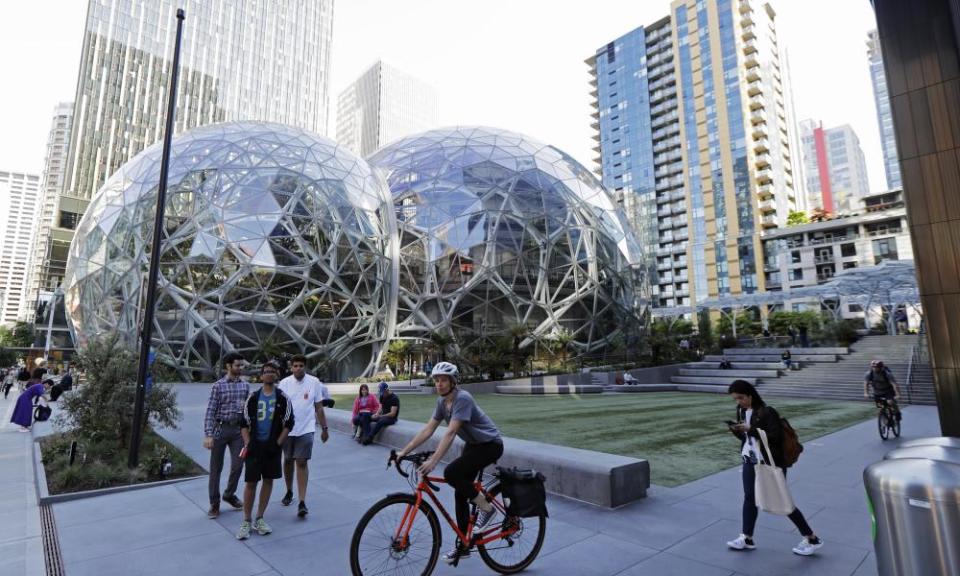Opposition to Seattle's 'Amazon tax' unites labor and big tech
The city council wants to impose a ‘head tax’ on big firms’ employees to tackle homelessness but the mayor says the plan ‘hurts workers’

Amazon and organized labor don’t often find common cause, but an unorthodox attempt at taxing big business has given them just that in Seattle.
Staring down the housing crisis facing America’s prosperous cities, some Seattle leaders hope to charge large employers for every employee working in the city. The “head tax” prompted Amazon, the city’s largest private employer and driving force behind Seattle’s booming real estate market, to stop construction at one office tower and move to shift 7,000 jobs to other locations.
Union construction workers, fearing a slump in building if Amazon gives up on the city, turned out in force against the measure.
Seattle leaders, like their counterparts in other left-leaning cities, have found easy villains in corporate titans.
Fast-food chains – McDonald’s chief among them – were politicians’ favorite foil in a successful 2014 push for a $15-an-hour minimum wage. Pepsi and Coca-Cola were similarly tarred during a 2016 campaign for a sweetened beverages tax, one tightly drawn to avoid sugary drinks from another Seattle-based giant, Starbucks.
With the head tax put forward this spring, city council members cut no such break for Amazon, whose headquarters injects a techy glitz to Seattle’s downtown and swells the city’s real estate market.
The tax would be imposed against the largest for-profit employers in the city, about 500 businesses in all. Were it to be enacted, it could generate, by estimates, about $75m a year for affordable housing and homeless services.
The tax is likely to pass the city council on Monday but may die on the mayor’s desk. In a statement on Friday, Mayor Jenny Durkan said the $500-per-employee tax, as drafted by the council, “hurts workers”.
“I cannot support it,” said Durkan, who proposed a limited tax carrying a $250-a-worker charge.
Revenue from the proposed tax is slated to address the housing crisis within Seattle, where real estate prices and rents have shot up in the past decade. Nearly half of the city’s renters are struggling even as household incomes jumped 27% from 2012 to 2016. Homelessness is ascendant in the city, where spring sun has again seen tents and shacks pop up along freeways and in city parks.
“We have a public health crisis. People are sleeping outside every day,” council member Teresa Mosqueda said on Friday. “Frankly, people are dying in our streets.”
Washington state, home to the two richest men in history – Amazon CEO Jeff Bezos and Bill Gates – is one of seven US states without an income tax. Instead, services are funded primarily through a sales tax, set at 10.1% in Seattle, and property taxes. Supporters of the head tax describe it as a step toward equitable taxation.
“A progressive tax on businesses most benefiting from this growth is our best option because we already rely heavily upon regressive property and sales taxes that hit everyone equally,” council member Lisa Herbold said by email.
A simmering fight on the tax boiled over on 2 May when Amazon confirmed it was pausing construction on Block 18, a 405,000 sq ft office building at the heart of its Seattle campus, and reconsidering a lease on another downtown tower.
“Pending the outcome of the head tax vote by City Council, Amazon has paused all construction planning on our Block 18 project in downtown Seattle and is evaluating options to sub-lease all space in our recently leased Rainier Square building,” Amazon vice-president Drew Herdener said by email.
Monty Anderson, executive secretary of the Seattle Building & Construction Trades Council, said he was concerned that the tax would stifle the city’s Amazon-driven building boom, which has made Seattle the nation’s construction crane capital since July 2016.
“The ability of us to work is based on companies wanting to come here and build. That’s just a fact for us,” said Anderson, who leads a collection of trade unions representing 10,500 workers.
“In ’08 and ’09, when the economy tanked and my members were homeless, drug addicted, committing suicide, it was a tragedy … Now people are building here, and we’re seeing an uptick of our membership into the middle class. Don’t take that away from us.”
Organizers with Working Washington, an advocacy organization for low-wage workers in the state, have asked that Bezos be prosecuted criminally for intimidation, comparing him to a mob boss.
Facing a signal from Durkan that she will veto the measure as proposed, supporters need to win over the mayor or a sixth member of the council. A 6-3 vote for the tax would be veto-proof.
Speaking after Friday’s hearing, Mosqueda said she was hopeful a compromise could be reached before a final vote on Monday.
“The unified message from city council today is that we need more revenue to build shelter and housing,” said Mosqueda, who added that she expects the final version of the bill to be different from the one passed on Friday by a 5-4 council vote.
If enacted, the tax would take effect in January. Supporters of the bill have planned a Saturday march on Amazon’s headquarters.
This article was amended on 14 May 2018 to clarify that the local sales tax rate in Seattle is 10.1%, and not 9.6%, as we originally said. This has now been changed.

